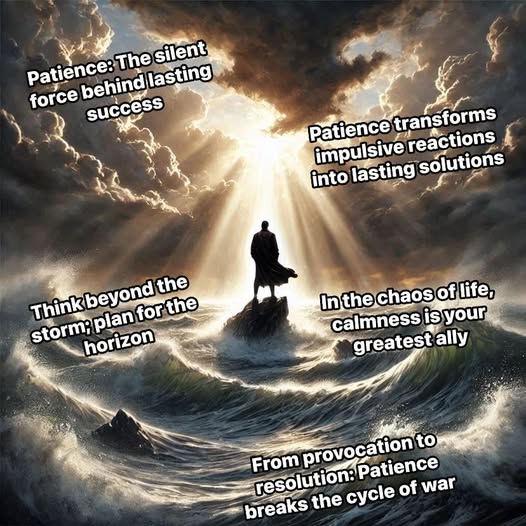
Once upon a time, in a small but thriving town, there lived a young man named John. He was known for his quick temper and impulsive nature. John was talented and ambitious, but his inability to stay calm during difficult situations often led him astray. His father, a wise and patient man, often advised him, saying, “Patience, my son, is the key to true success. It allows you to see beyond the storm of the moment and chart a course for a brighter tomorrow.”
One day, John found himself in the middle of a heated dispute in the town square. A merchant accused him of damaging his goods, which John firmly denied. The crowd gathered, and their murmurs only added fuel to John’s anger. His face turned red, and he was ready to lash out in defense.
But just before he spoke, he remembered his father’s words: “Avoid being a victim of provocation. Go beyond immediate circumstances, and refrain from reactionary responses.” John took a deep breath and paused.
“I understand you’re upset,” John said calmly to the merchant. “Let’s take a step back and discuss this reasonably. Perhaps we can find a solution together.”
The merchant, surprised by John’s restraint, agreed to talk. As they unraveled the misunderstanding, it became clear that neither of them was at fault. The real culprit was a loose piece of fabric that had fallen from a cart, causing the damage. The situation, once heated, ended peacefully, and John earned the respect of those who witnessed his composure.
That night, as John sat with his father recounting the events of the day, his father said, “Today, you not only practiced patience but also avoided a chain reaction of anger. Remember, my son, anger, when left unchecked, has the power to escalate into something far worse—war.”
His father leaned forward, his voice calm but firm. “War,” he continued, “is the ultimate consequence of anger and provocation. It begins with a spark of hostility but consumes everything in its path. And do you know why wars rarely end with peace? Because they start with anger—a negative emotion. Negative emotions can never produce positive outcomes.”
John reflected deeply on his father’s words. He realized how often anger blinds people to reason, leading to rash decisions that spiral into greater conflicts. He vowed to break free from the cycle of provocation and negativity.
Over time, John embraced patience and self-restraint as a way of life. He learned to take a step back during moments of anger or confusion, analyzing situations from every angle. This transformation turned him into a visionary thinker, someone who could see the big picture, and plan not just for today but for the years to come.
When John eventually took on a leadership role in the town, he often reminded his people of the perils of anger. He addressed disputes with calm diplomacy and taught his community that restraint was not a sign of weakness but a powerful force for long-term peace.
“Remember,” he often told his people, “anger leads to destruction because it clouds our judgment and fuels division. Only patience and understanding can break this cycle and pave the way for lasting harmony. If we want positive outcomes, we must start with positive emotions.”
John’s legacy became one of calm leadership and enduring wisdom, a testament to the power of patience in breaking the cycle of anger and building a future filled with promise and peace.

